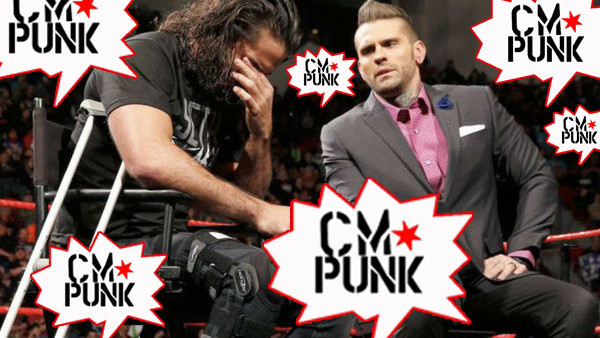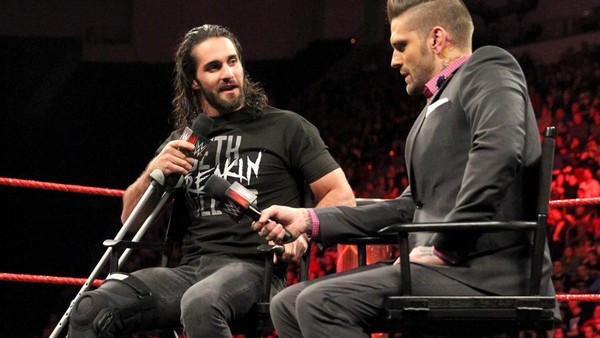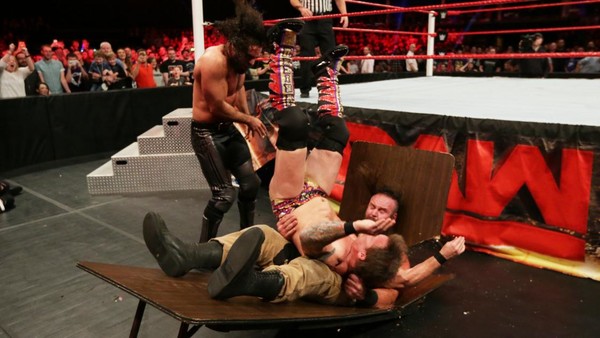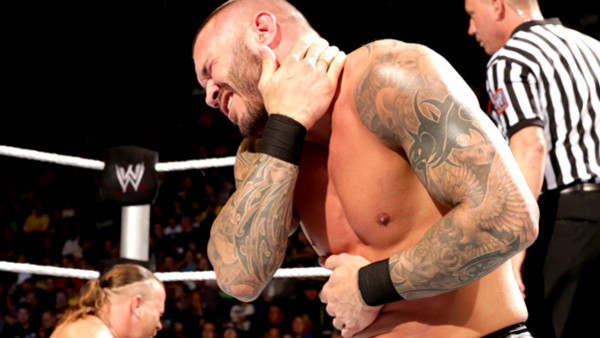Are Wrestling Fans Ruining The Product?
“CM Punk! CM Punk! CM Punk!”

On this week’s episode of Monday Night RAW, Seth Rollins delivered what was conveyed as a heart-wrenching soliloquy, in which he cast doubt over his participation at WrestleMania 33. It was far from his smoothest performance on the stick; a visibly shaken Rollins stumbled over his words when explaining the extent of his injury to Corey Graves in an in-ring sit-down interview. But then, it made sense in the moment. Rollins wasn’t reading from a script - or, more accurately, he was, he just concealed it well enough - but his outpouring was met with cynicism, regardless.
Rollins even acknowledged history, something WWE rarely does, even when it’s convenient to do so. Fans have for aeons criticised WWE for refusing to do just that. When Triple H challenged The Undertaker to a match at WrestleMania XXVII, their initial meeting was treated as if it had never happened. Fans challenged that. They owned the DVD. WWE couldn’t rewrite shared history.
And yet, when Rollins alluded to his disgust at the motivation behind his actions at WrestleMania - ostensibly reconciling his abrupt, enforced babyface turn post-SummerSlam, clarifying a muddied and much-criticised picture - fans instead, inexplicably, started up a “CM Punk!” chant. It’s difficult to comprehend what the Green Bay crowd were driving at.
Did they buy Rollins’ act, and suggest a replacement? Or is “CM Punk!” now shorthand for complete disinterest? Or are certain pockets of the wrestling fandom stupid enough to think he’ll come back because they are petitioning him to do so? Is it indicative of a wider sense of entitlement, and to what extent does the product suffer because of it? Crowd participation is a fundamental component of professional wrestling - but the second that participation detracts from the action is the second the product suffers.

It’s all a matter of taste, of course. Even if it’s ultimately in vain, the anti-Roman Reigns sentiment, for example, is a good thing, if only because it conveys to WWE that their recycled formulas no longer engage. Fans are actually trying to accomplish something with their dissent - but the newfound power isn’t always used to instigate change. All too often, it is used indulgently.
Before RAW, Rollins was a figure of sympathy, one most right-thinking fans felt was deeply unfortunate in his luck. When the show drew to a close, he was an inadequate replacement for a man who left, three years ago, of his own volition. “His acting was horrible, though,” is one criticism I’ve read. Are fans to attuned to WWE’s seamless scripting that an attempt at cracked emotion is met with derision? Was Rollins any better when he taunted Chris Jericho with the schoolyard phrase “Sparklecrotch”?
Wrestling fans have always been an obnoxious bunch, something made excruciatingly audible when Steve Austin popularised his “What?” chant in 2001 - which fans co-opted whenever they rejected an angle in ensuing years. Wrestling fans popped huge when Billy and Chuck renounced homosexuality in their appalling, aborted wedding in late 2002. Wrestling fans bemoan WWE’s PG direction and mourn the Attitude Era, as if lewd behaviour is an acceptable substitute for creativity. The Attitude Era died because the returns diminished. Fans, up until very recently, implored female wrestlers en masse to show their t*ts. Fans beg for tables minutes into any No Holds Barred or derivative stipulation.

The “What?” chants were, if completely irritating, then at least productive, to an extent. It was a simple way of informing WWE that what was being presented was being rejected - a reliable barometer. In recent years, the needle on that barometer has detached entirely. Look no further than Bull Dempsey: the limited developmental talent got over in the forgiving confines of NXT to a degree so porous as to not exist. The Full Sail crowds chanted “Bullfit!”- but was that a reflection on the man himself, or were they merely amused at the pun? Were they, ultimately, entertaining themselves?
Of course, wrestling fans can’t be expected to just play along - it’s equally likely that this new trend of self-reverence has coincided with WWE’s refusal to pander to their tastes. The company has spent so long pushing Roman Reigns down their throats that such ugly regurgitation is somewhat inevitable. Moreover, the rise of social media has led many to discover their voice - and pro wrestling is a uniquely idiosyncratic performance art, one in which fan interaction is encouraged - but where is the line? That line is always going to be blurred, but the real target of audience ire is unmistakable. Seth Rollins was reading from a script. Blame the writers, not him, for the hackneyed promo he did well to humanise. Start up a a “Fire the writers!” chant, if you’re so desperate to “#useyourvoice”. They deserve your obnoxious disrespect. They’ve effectively turned Bayley - Bayley! - heel. Rollins is a symptom - not the disease. That script was effective, in places - but how much better would Rollins’ performance have been, if it was entirely organic?
This new trend, of receiving the product with an ironic, self-serving distance, is a direct consequence of their fractured relationship with WWE.
But is it? Go to any independent wrestling show across the UK or the US, and you’ll see the same thing. When a referee counts to ten, as the men and women in the ring struggle to get back on their feet, their plight is invariably ignored. Instead, fans chant “Five!” at a four count, trying to catch out the man in the black and white stripes. It matters little to them that the toils of a war are being sold, that a story is in progress. It’s obnoxious in the extreme, but your mileage may vary, especially if you’re the sort to start chanting for another performer in the middle of another’s match - but, more so than that, it is disrespectful. When a performer battles to their feet, valiantly trying to beat the count of ten, they are attempting to tell a story. Boorishly shouting over it is akin to ripping the pages from a library book, a shared cultural institution tethered only by fading mutual respect. No longer is the heel generating heat; instead, the fans themselves are the ones most deserving of hatred. And people wonder why there is no such thing as a babyface anymore.

Selling in itself barely matters, either, and that perhaps is the most worrying development of all. Fans no longer empathise with the plight of a wrestler receiving untold punishment - their pain, the essence of what the industry is built on, is now “awesome!”. The very point has been entirely missed by a generation of fans who have discovered the power of their own voice - and used it to indulge themselves.
If you don’t like the show, don’t buy the ticket - and if you don’t like the action, just take a break from it. Don’t ruin it for everybody else. Beyond the simple concept of manners, you are your own worst enemy. The irony is that silence is the wrestling killer. Occupying silence with gratuitous and irritating noise just conveys the message that a reaction is being elicited from you. You are the architect of your own boredom.
And, if you make yourself a part of the show, don’t expect to avoid criticism. You’re as much a part of it as the talent now.